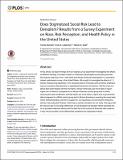| dc.contributor.author | Dunham, Yarrow | |
| dc.contributor.author | Snell, Steven A. | |
| dc.contributor.author | Lieberman, Evan S | |
| dc.date.accessioned | 2017-05-05T22:20:38Z | |
| dc.date.available | 2017-05-05T22:20:38Z | |
| dc.date.issued | 2016-03 | |
| dc.date.submitted | 2015-07 | |
| dc.identifier.issn | 1932-6203 | |
| dc.identifier.uri | http://hdl.handle.net/1721.1/108714 | |
| dc.description.abstract | In this article, we report findings from an original survey experiment investigating the effects of different framings of disease threats on individual risk perceptions and policy priorities. We analyze responses from 1,946 white and African-American participants in a self-administered, web-based survey in the United States. We sought to investigate the effects of: 1) frames emphasizing disparities in the racial prevalence of disease and 2) frames emphasizing non-normative (blameworthy or stigmatized) behavioral risk factors. We find some evidence that when treated with the first frame, African-Americans are more likely to report higher risk of infection (compared to an African-American control group and to whites receiving the same treatment); and that whites are more likely to report trust in government data (compared to a White control group and to African-Americans receiving the same treatment). Notwithstanding, we find no support for our hypotheses concerning the interactive effects of providing both frames, which was a central motivation for our study. We argue that this may be due to very large differences in risk perception at baseline (which generate limits on possible treatment effects) and the fact that in the context of American race relations, it may not be possible to fully differentiate racialized and stigmatized frames. | en_US |
| dc.description.sponsorship | Princeton University. Center for Health and Wellbeing | en_US |
| dc.language.iso | en_US | |
| dc.publisher | Public Library of Science | en_US |
| dc.relation.isversionof | http://dx.doi.org/10.1371/journal.pone.0147219 | en_US |
| dc.rights | Creative Commons Attribution | en_US |
| dc.rights.uri | http://creativecommons.org/licenses/by/4.0/ | en_US |
| dc.source | Public Library of Science | en_US |
| dc.title | Does Stigmatized Social Risk Lead to Denialism? Results from a Survey Experiment on Race, Risk Perception, and Health Policy in the United States | en_US |
| dc.type | Article | en_US |
| dc.identifier.citation | Dunham, Yarrow, Evan S. Lieberman, and Steven A. Snell. “Does Stigmatized Social Risk Lead to Denialism? Results from a Survey Experiment on Race, Risk Perception, and Health Policy in the United States.” Edited by Bamidele O. Tayo. PLoS ONE 11, no. 3 (March 10, 2016): e0147219. | en_US |
| dc.contributor.department | Massachusetts Institute of Technology. Department of Political Science | en_US |
| dc.contributor.mitauthor | Lieberman, Evan S | |
| dc.relation.journal | PLoS ONE | en_US |
| dc.eprint.version | Final published version | en_US |
| dc.type.uri | http://purl.org/eprint/type/JournalArticle | en_US |
| eprint.status | http://purl.org/eprint/status/PeerReviewed | en_US |
| dspace.orderedauthors | Dunham, Yarrow; Lieberman, Evan S.; Snell, Steven A. | en_US |
| dspace.embargo.terms | N | en_US |
| dc.identifier.orcid | https://orcid.org/0000-0001-9242-5687 | |
| mit.license | OPEN_ACCESS_POLICY | en_US |
